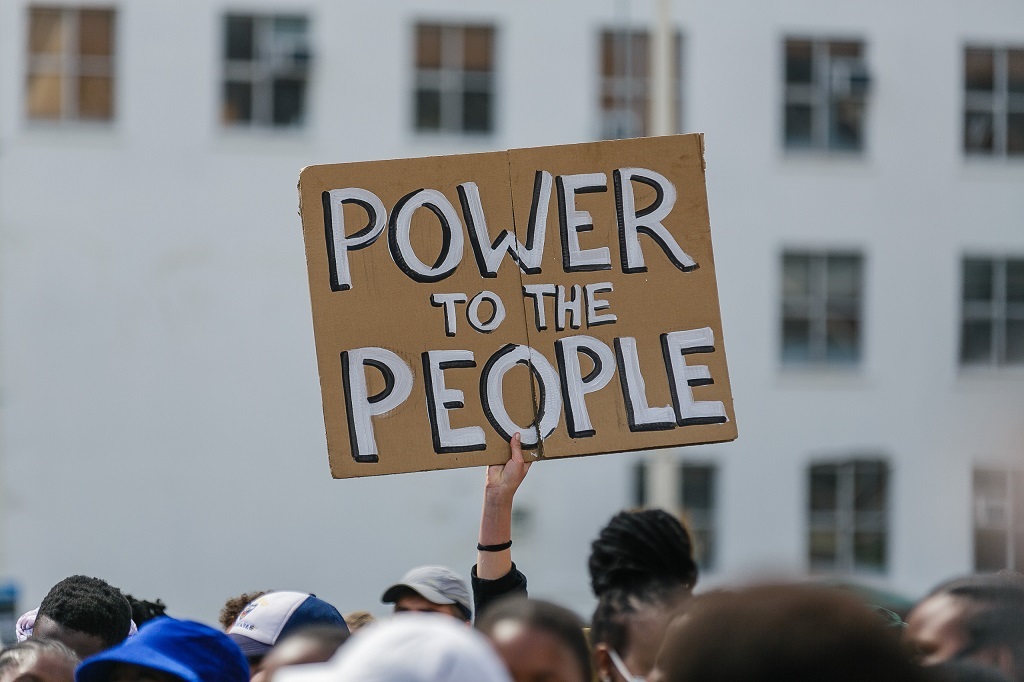
Even if you don't see yourself as an "activist" or the marching type, there is room for everyone in the movement towards a more just and sustainable present and future. We show up for system change with the votes we cast, the protests we attend, the voices we amplify, and the causes we advocate for – in small gestures and grand actions, write Claire Rousell, Lisa Makaula, Aphiwe Ngalo, Geronimo De Klerk, Afika Ndlela and Stella Hertantyo.
- For climate change news and analysis, go to News24 Climate Future.
In 2024, approximately half of the world's population will vote in a major election. We have seen a large groundswell of protests organised by ordinary people standing up against genocide, climate injustice and unjust systems around the world.
It has never been clearer that the dominant systems are failing the majority of people and that the world is ripe for systems change. While it may seem as though there are no coherent alternatives, the seeds of new systems are growing from the ground up.
Systems researcher, Donella Meadows, identified many potential places where change can happen within societies. The most powerful of these is in shifting the power dynamics and the goals of the system. By realising that if we act collectively, we, the people, hold considerable power.
Likewise, if we see the issues as interconnected, rather than in isolation, we can see them as part of a system with specific goals, that currently are not those of justice, health and sustainability. With this awareness, we can begin to reorient the systems we are part of towards thriving societies within healthy and abundant ecosystems.
We all have a part to play in this process. Even if you don't see yourself as an "activist" or the marching type, there is room for everyone in the movement towards a more just and sustainable present and future. We show up for system change with the votes we cast, the protests we attend, the voices we amplify, and the causes we advocate for – in small gestures and grand actions.
READ | 'Unbearable to live': Conditions for Laudium residents get worse - and the heat is to blame
As civil society groups and March for Systems Change organisers, we have identified six intersecting areas, forming part of the current social and ecological crisis, that need urgent attention to create a more just and sustainable society.
The following areas of focus may seem to be ambitious goals to work towards, but we know that we will only achieve system change through intersectoral collaboration. By seeing the connections rather than working in silos.
Energy justice
South Africa currently depends on unreliable, non-renewable and socio-environmentally harmful energy sources. Electricity generated by fossil fuels contributes to air pollution and climate change, which disproportionately affects marginalised communities, while benefiting only a few. Energy justice is the equitable distribution of reliable, safe and affordable energy from more sustainable sources.
The March for Systems Change calls for an end to new fossil fuel and nuclear projects.
Instead, we propose the implementation of socially owned renewables through a just energy transition. As an immediate, practical step towards this aim, we insist that energy poverty, load shedding and environmental concerns must be addressed by SA's new draft Integrated Resources Plan and all future energy policies.
Water justice
Our access to water is at risk due to depletion and pollution by extractive industries, such as mining, as well as climate change-induced droughts. This threatens not only access to drinking water but also food production, sanitation, and other water uses. Water injustice is exacerbated by historical inequalities in access to and management of water sources.
Water justice means everyone has access to sufficient drinking water to sustain health and livelihoods, and to ensure ongoing socioeconomic activity and political stability.
The March for Systems Change is demanding that access to water be upheld as a human right. We call for an end to corporate water exploitation and to prioritise equitable access, sustainability, justice and community-led decision-making in water management and governance.
Food justice
The capitalist food system both contributes to and is vulnerable to climate change. Unsustainable farming practices, an unjust profit-driven food system and the effects of climate change, such as droughts and floods, adversely impact food production and access to food.
The March for Systems Change is calling for support for policies that ensure that everyone enjoys the right to food. There is an urgent need to support more just, sustainable and localised food systems, through agro-ecology, farmers' rights, and decent livelihoods.
Spatial justice
The financialisation of land and lack of access to adequate housing equate to high levels of homelessness, as well as inadequate housing that is far from economic opportunities, creating inescapable poverty traps.
The intensity and frequency of climate-related events, such as floods and fires, worsen existing spatial injustice. Land and housing justice exists when all people have access to safe, affordable and adequate housing and historical land injustice has been meaningfully addressed and apartheid spatial planning is disrupted.
The March for Systems Change calls for the development of accessible and climate-resilient housing, and transport options for all. Policies should ensure equitable land redistribution and security of tenure for residents in informal settlements and vulnerable housing situations. Communities and their current interventions in the face of this housing crisis should be given space to play an integral part in the planning and implementation of land and housing policies.
Addressing gender-based violence
Gender-based violence (GBV) is any form of violence or abuse against someone because of their gender. South Africa has one of the highest rates of GBV in the world. Climate change worsens existing gender inequalities by increasing natural disasters that exacerbate unequal access to resources and exposure to violence.
The March for Systems Change demands the establishment of systems of security and accountability for women and marginalised genders who are affected by GBV. This must extend to gender-sensitive climate adaptation strategies that promote resilience-building efforts and address the underlying inequalities that underpin GBV.
Global solidarity
Powerful movements for systemic change are built through collective support and cooperation at local, national and global levels to address common challenges and collaborate to achieve socio-environmental justice.
Genocide and war destroy food, water and energy systems, as well as the agency of people to access their basic human rights. They erode peoples’ resilience in facing the climate crisis. These atrocities are funded and carried out by imperialist powers and multinational corporations, and are rooted in colonial and extractive ideologies.
South Africa's national and foreign policies must show solidarity and committed action to people across Africa, in particular, Sudan and Congo, and in Palestine. That means prioritising an end to xenophobia, being willing to defend the rights of people affected by conflict across Africa, and cutting all ties with Israel, while continuing to call for an immediate and lasting ceasefire.
Ultimately, the call for systemic change isn't merely idealistic; it's grounded in the understanding that our current systems are unsustainable and unjust. Each of these causes is powerful on its own, but understanding the interconnections is what makes them transformative. By recognising the interconnectedness of these issues and advocating for policies and actions that prioritise justice, equity, and sustainability, there's potential to create thriving societies and healthy ecosystems.
Claire Rousell, Lisa Makaula (Green Connection), Aphiwe Ngalo (Ndifuna Ukwazi), Geronimo De Klerk (Feed the Future), Afika Ndlela (Environmental Monitoring Group), Stella Hertantyo (African Climate Alliance) are part of the March for System Change organising group calling for system change for people, planet and future generations.
News24 encourages freedom of speech and the expression of diverse views. The views of columnists published on News24 are therefore their own and do not necessarily represent the views of News24.




 Publications
Publications
 Partners
Partners












